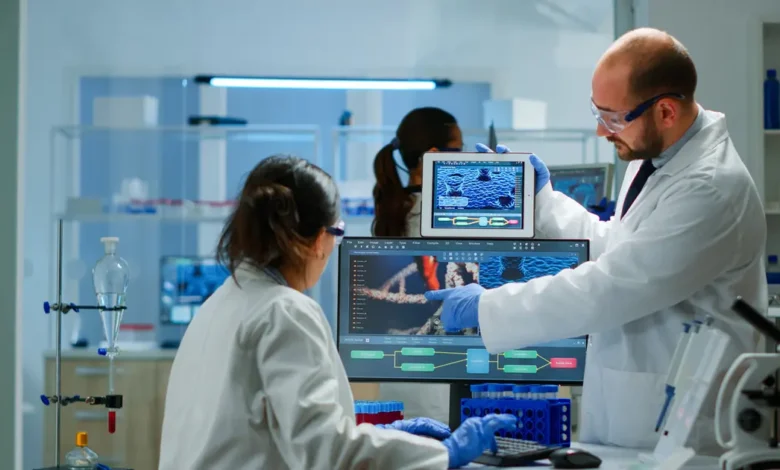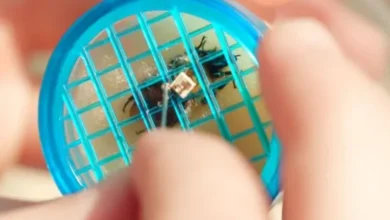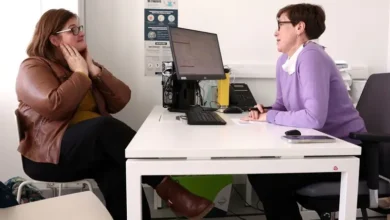How Saudi Arabia is building a future-ready healthcare system with help from Roche

Saudi Arabia has rapidly emerged as a regional leader in healthcare innovation, earning international recognition for its effective COVID-19 response, investments in digital health infrastructure, and efforts to advance precision medicine and biotechnology.
The Kingdom’s bold reforms under Vision 2030 have positioned it at the forefront of medical transformation in the Middle East, with ambitions to make healthcare more preventive, personalized, and data-driven.
Led by the Ministry of Health and the Vision Realization Program known as the Health Sector Transformation Program (HSTP), it aims to create a world-class, patient-centered, and sustainable healthcare system.
As part of this transformation, Roche Diagnostics – one of the world’s largest biotech companies and leading in-vitro diagnostics laboratory – is intensifying its engagement with Saudi Arabia.
In an interview with Al Arabiya English, Abdul Qayyum, General Manager of Roche Diagnostics Saudi Arabia, said that Saudi Arabia has put strong emphasis on creating a ground-breaking healthcare ecosystem.

“Saudi Arabia is undergoing a bold and transformative shift in healthcare as part of Vision 2030, with major investments in innovation, digital health, and future-ready infrastructure,” said Qayyum.
“Diagnostics are central to that transformation.”
He added: “The country has created the right environment: forward-thinking policies, strong leadership, and a national agenda that puts innovation at the core of health outcomes.”
Proactive care and local partnerships
Roche has also put massive emphasis on shifting healthcare from reactive to proactive – a goal that is greatly aligned with Saudi Arabia’s reform plan.
“We’re working hand-in-hand with stakeholders in the Kingdom to help shift the healthcare model from reactive to proactive,” he said. “That means investing in early detection, personalized care, and smart diagnostics.”
He stressed that collaboration with local institutions is essential to making that happen.
“We’re committed to ensuring patients have access to these breakthroughs as quickly as possible; by working hand in hand with healthcare providers, regulators, and partners across the ecosystem,” he said.
“That includes everything from public-private partnerships to knowledge-sharing initiatives. It’s not just about bringing in global tools—it’s about working together to tailor those tools to the local context so they truly serve patients here.”
According to him, localization is also a core part of the strategy.
“We’re also focusing on localization—not just bringing solutions in, but building capability on the ground,” Qayyum said, adding that this includes supporting lab infrastructure and developing local partnerships.
Roche’s regional strategy is based on four pillars: innovation-driven partnerships, adapting global knowledge for local needs, expanding diagnostic access and sustainability, and applying global implementation experience to streamline diagnostics across Saudi Arabia’s health system.
“Partners gain early access to next-generation technologies and transformative tools to improve patient outcomes,” said Qayyum.
“Our approach, backed by global implementations knowledge, ensures seamless consolidation, standardization, and innovation in diagnostics aligned with Saudi Vision 2030.”
AI and automation-driven diagnostics
According to Qayyum, Roche is using artificial intelligence and digital tools to help clinicians make faster, more accurate decisions.
“Our digital pathology tools are transforming how diseases are diagnosed, especially in complex cases like cancer,” he said.
Automation plays a key role in improving efficiency, according to the general manager.
“The more we can streamline lab workflows and reduce turnaround times, the faster patients get answers and start the right treatment,” he noted.
This approach is closely aligned with the Kingdom’s HSTP, which identifies diagnostics as a foundational element in shifting from reactive to preventive care.
The program emphasizes the importance of early detection, personalized medicine, and data-driven decision-making—goals that rely heavily on advanced diagnostic capabilities powered by AI and digital technologies.
Improving diagnostics is also key to reducing the burden of non-communicable diseases such as cancer and diabetes, which are a major focus of national health initiatives.
Near-patient testing, especially in underserved areas, also plays a major role in improving access to healthcare, he emphasized.
“Near patient care and point of care testing is also a way of ensuring that more patients can access the high-quality testing that underpins accurate healthcare decision-making,” he said. “Bringing testing closer to where patients live, including remote communities, decentralized diagnostics have the potential to democratize healthcare.”
Bringing such innovation to life is only possible through digital tools and integrated systems, he noted – all of which are a major focus of Roche’s digital strategy in the Kingdom.
The future of diagnostics in Saudi Arabia
In the next two or three years, Roche’s goals in Saudi Arabia are focused on three key areas: improving access, expanding digital tools, and building local capabilities.
“First, expanding access to high-quality diagnostics across all regions, not just big cities through our near patient care innovations,” he said.
“Second, launching and scaling up our digital and AI-powered solutions to support more personalized, preventative care. And third, strengthening local capabilities—whether that’s through partnerships, training, or infrastructure.”
This includes early-career programs, capacity-building, and technology training initiatives.
Qayyum told Al Arabiya English that he sees the diagnostics sector in Saudi Arabia moving rapidly toward decentralization, near-patient testing, and integrated models of care.
“The Kingdom is clearly moving toward a more data-driven, patient-focused system, and diagnostics sit at the very heart of that,” he said.
“I believe that supporting local talent and bringing top experts to Saudi Arabia are key to unlocking the country’s potential,” Qayyum said.
“To build the future of healthcare, we need to invest in people; give them chances to grow, lead, and make a real difference to the whole economy, not just the healthcare sector.”










